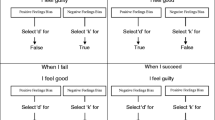Abstract
The current study was largely exploratory and sought to begin the development of a measure of implicit forgiveness of self related to “minor” transgressions (mistakes, flaws, shortcomings) versus the forgiveness of others. Forty-seven students completed a scale designed to measure forgiveness of self and others using the implicit relational assessment procedure (IRAP). The results indicated that the measure of implicit forgiveness diverged from an explicit measure designed to measure the same construct. The key finding was that participants tended to be more forgiving toward themselves than toward others at an implicit level, but on an explicit measure, participants rated their own failures as less acceptable than the failures of others. Overall, the findings suggest that it may be useful to supplement explicit measures of forgiveness with implicit measures in future research.


Similar content being viewed by others
References
Barnes-Holmes, D., Barnes-Holmes, Y., Stewart, I., & Boles, S. (2010a). A sketch of the implicit relational assessment procedure (IRAP) and the relational elaboration and coherence (REC) model. The Psychological Record, 60, 527–542.
Barnes-Holmes, D., Murtagh, L., Barnes-Holmes, Y., & Stewart, I. (2010b). Using the implicit association test and the implicit relational assessment procedure to measure attitudes toward meat and vegetables in vegetarians and meat-eaters. The Psychological Record, 60, 287–306.
Berry, J. W., Worthington, E. L., Jr., Parrot, L., III, O’Connor, L. E., & Wade, N. G. (2001). Dispositional forgiveness: development and construct validity of the Transgression Narrative Test of Forgiveness (TNTF). Personality and Social Psychology Bulletin, 27, 1277–1290. doi:10.1177/014616720122710004.
Brose, L. A., Rye, M. S., & Lutz-Zois, C. (2005). Forgiveness and personality traits. Personality and Individual Differences, 39, 35–46. doi:10.1016/j.paid.2004.11.001.
Buechsel, R. (2010). Development of an implicit measure of dispositional forgiveness (Doctoral dissertation). Retrieved from Pro Quest Dissertations and Thesis. (UMI No. 3418958).
Cardi, M., Milich, R., Harris, M. J., & Kearns, E. (2007). Self-esteem moderates the response to forgiveness instructions among women with a history of victimization. Journal of Research in Personality, 41, 804–819.
Cullen, C., & Barnes-Holmes, D. (2008). Implicit pride and prejudice: A heterosexual phenomenon? In T. G. Morrison & M. A. Morrison (Eds.), Modern prejudice (pp. 195–223). New York: Nova Science.
Goldring, J. (2011). The development of an implicit association test for measuring forgiveness (Doctoral dissertation). Retrieved from Adelaide Research & Scholarship. (Accession available online: http://hdl.handle.net/2440/67104)
Greenwald, A. G., Nosek, B. A., & Banaji, M. R. (2003). Understanding and using the implicit association test: I. an improved scoring algorithm. Journal of Personality and Social Psychology, 85, 197–216
Hayes, S. C. (1993). Analytic goals and the varieties of scientific contextualism. In S. C. Hayes, L. J. Hayes, H. W. Reese, & T. R. Sarbin (Eds.), Varieties of scientific contextualism (pp. 11–27). Reno: Context Press.
Hughes, S., Barnes-Holmes, D., & De Houwer, J. (2011). The dominance of associative theorising in implicit attitude research: Propositional and behavioral alternatives. The Psychological Record, 61, 465–498.
Hughes, S., Barnes-Holmes, D., & Vahey, N. (2012). Holding on to our functional roots when exploring new intellectual islands: A voyage through implicit cognition research. Journal of Contextual Behavioral Science, 1, 17–38.
Leach, M. M., & Lark, R. (2004). Does spirituality add to personality in the study of trait forgiveness? Personality and Individual Differences, 37, 147–156. doi:10.1016/j.paid.2003.08.007.
McCullough, M. E. (2001). Forgiveness: who does it and how do they do it? Current Directions in Psychological Science, 10, 194–197.
McCullough, M. E., Worthington, E. L., Jr., & Rachal, K. C. (1997). Interpersonal forgiving in close relationships. Journal of Personality and Social Psychology, 73, 321–336.
McCullough, M. E., Rachal, K. C., Sandage, S. J., Worthington, E. L., Jr., Brown, S. W., & Hight, T. L. (1998). Interpersonal forgiving in close relationships: II. Theoretical elaboration and measurement. Journal of Personality and Social Psychology, 75, 1586–1603.
Pepper, S. C. (1942). World hypotheses: A study in evidence. Berkeley: University of California Press.
Power, P. M., Barnes-Holmes, D., Barnes-Holmes, Y., & Stewart, I. (2009). The implicit relational assessment procedure (IRAP) as a measure of implicit relative preferences: a first study. The Psychological Record, 59, 621–640.
Powers, C., Nam, R., Rowatt, W. C., & Hill, P. (2007). Associations between humility, spiritual transcendence, and forgiveness. In R. Piedmont (Ed.), Research in the social scientific study of religion (pp. 74–94). Herndon: Brill Academic.
Roddy, S., Stewart, I., & Barnes-Holmes, D. (2012). Facial reactions reveal that slim is good but fat is not bad: Implicit and explicit measures of body-size bias. European Journal of Social Psychology, 41(6), 688–694.
Roddy, S., Stewart, I., & Barnes-Holmes, D. (2010). Anti-fat, pro-slim, or both? Using two reaction time based measures to assess implicit attitudes to the slim and overweight. Journal of Health Psychology, 15, 416–425.
Tangney, J. P., Boone, A. L., & Dearing, R. (2005). Forgiving the self: Conceptual issues and empirical findings. In E. L. Worthington Jr. (Ed.), Handbook of forgiveness (pp. 143–158). New York: Brunner-Routledge.
Vahey, N., Boles, S., & Barnes-Holmes, D. (2010). Measuring adolescents’ smoking-related social identity preferences with the implicit relational assessment procedure (IRAP) for the first time: a starting point that explains later IRAP evolutions. International Journal of Psychology and Psychological Therapy, 10, 453–474.
Worthington, E. L., Jr. (1998). The pyramid model of forgiveness: Some interdisciplinary speculations about unforgiveness and the promotion of forgiveness. In E. L. Worthington, Jr. (Ed.), Dimensions of forgiveness (pp. 107–138). Radnor, PA: Templeton Foundation Press.
Author information
Authors and Affiliations
Corresponding author
Rights and permissions
About this article
Cite this article
Bast, D.F., Barnes-Holmes, D. A First Test of the Implicit Relational Assessment Procedure as a Measure of Forgiveness of Self and Others. Psychol Rec 64, 253–260 (2014). https://doi.org/10.1007/s40732-014-0022-2
Published:
Issue Date:
DOI: https://doi.org/10.1007/s40732-014-0022-2




